This post may contain affiliate links, which means I get a small percentage of the sale at no extra cost to you. I only recommend items I love and have had a positive experience with. Thank you!
This pure homemade lemon extract is divine! With only 2 ingredients, it’s a breeze to make. Try it today and give your recipes a burst a fresh lemon flavor!
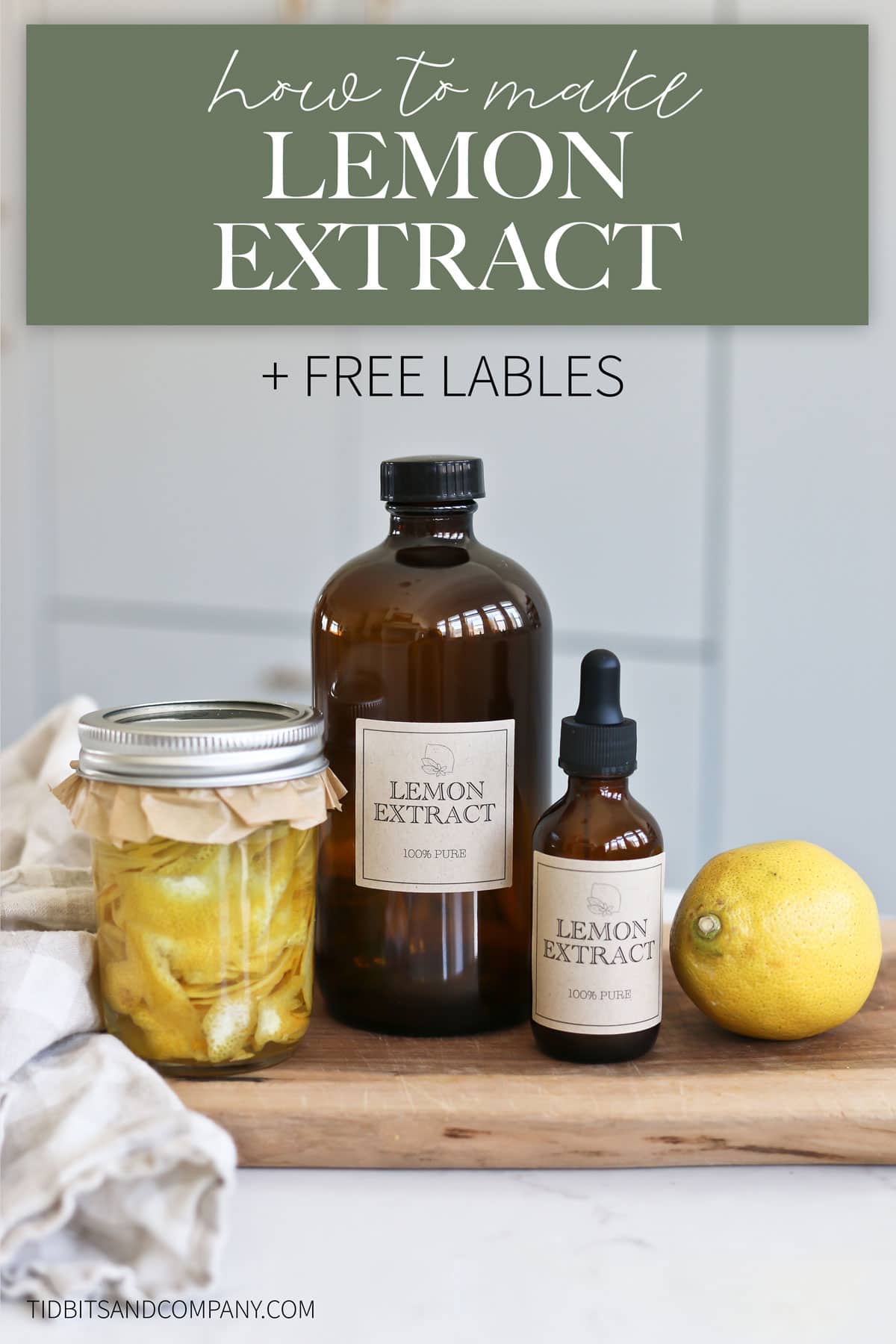
You’re probably familiar with lemon juice, but have you tried pure homemade lemon extract in your cooking and baking? It’s so good!
If you’ve never tried it or made it before, I hope to convince you to do so. It’s super easy to make and it adds the perfect touch of fresh lemon flavor to your gourmet creations.
Just like other homemade extracts, homemade lemon extract has much better flavor than anything you’ll buy at the store.
I have a whole collection of homemade extract recipes. If you want to get started making your own, try homemade vanilla extract, homemade orange extract, homemade mint extract or homemade lavender extract.
Homemade Lemon Extract
Lemon extract is delicious! Unlike lemon juice, which is highly acidic, lemon extract has a fresh and sweet flavor without the strong sour tang of lemon juice. It smells great and tastes great. What’s not to love?
Homemade lemon extract also couldn’t be simpler to make. It’s made by soaking lemon peels in a high proof alcohol to extract the flavor and aroma of the lemons. No artificial colors, flavors or added chemicals. It’s 100% pure and flavorful.
Once your lemon extract is done, you can use it for all sorts of tasty dishes like cakes, frosting, cookies and muffins. Believe me, it’s worth having some lemon extract on hand!
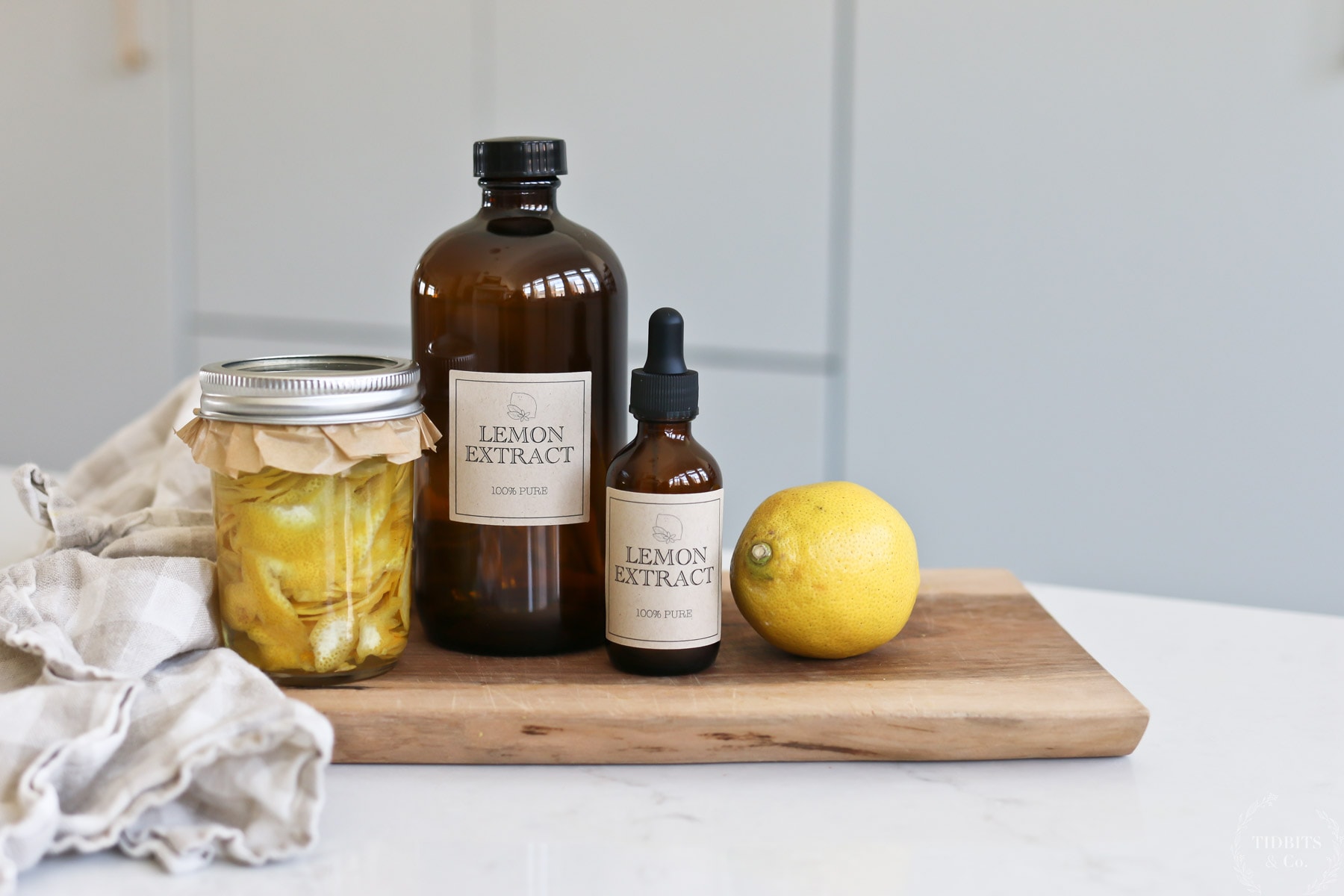
Table of contents
- Homemade Lemon Extract
- Why You’ll Love Homemade Lemon Extract
- What You’ll Need to Make Lemon Extract
- Step-by-Step Instructions
- Storing Your Lemon Extract
- Free Printable Labels
- Lemon Extract Variations
- Ideas for Using Lemon Extract
- Lemon Extract Substitutes
- Alcohol Free Lemon Extract
- Cost Analysis – Is it Worth it?
- FAQ’s
- Try These Other Extract and Herbs Recipes
Why You’ll Love Homemade Lemon Extract
I think you’re really going to love making your own lemon extract! Here are just some of the things that make homemade lemon extract so great:
- Easy to make – You can craft a batch of homemade lemon extract with almost no prep time and only 2 ingredients.
- Cost effective – This extract can be make at a fraction of the cost of store-bought lemon extract. Keep reading below to see my cost comparison for homemade vs. store-bought lemon extract.
- Customizable – You can control the strength of your lemon extract by adding more or less lemon peel to your extraction.
- Variable – Try combining your lemon extract with other complimentary extracts for unique flavor combinations. You can even add extra ingredients like lime peels to your extraction for a custom flavor profile.
- Contains to extra additives – No surprises, you control the ingredients and know exactly what you’re getting.
- Great for gifting – Homemade lemon extract makes a perfect holiday gift. Don’t forget to take advantage of the free printable labels I’ve included below!
- Tastes amazing – Store-bought extracts just can’t compare to homemade.
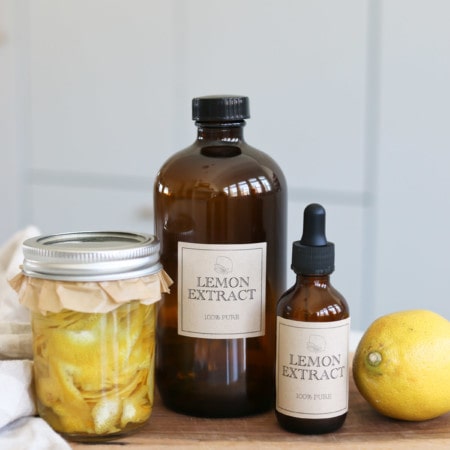
Homemade Lemon Extract
Equipment
- Glass jar with a lid
- parchment paper
- Label with product name, start and end date
- Zest peeler
Ingredients
- Lemon peels
- Vodka or other high proof alcohol
Instructions
- Gather your lemons, zest peeler, clean jar and lid, parchment paper and a label.
- Use a zest peeler to peel the colorful skin off of the lemons, avoiding the white pith underneath.
- Fill your clean jar with as many lemon peels as desired.
- Add the vodka or your alcohol of choice. Add enough alcohol to submerge the lemon peels. Leave a bit of head space at the top of the jar.
- Place a piece of parchment paper between the jar and lid to prevent possible corrosion from the alcohol touching the metal lid.
- Seal the jar closed.
- Label the jar with the product name, start and end date.
- Place the jar of lemon extract in a cool, dark place and allow it to extract for 6-8 weeks.
- Every few days, give your jar of extract a shake to help aid the extraction process.
- When the extraction time is up, check you extract. If you feel like it needs to be stronger, simply give it a little more time until you're satisfied with the finished product.
- If desired, transfer to smaller bottles that are convenient to use.
- Keep your lemon extract stored in a cool, dark place for the best shelf life.
- Enjoy!

What You’ll Need to Make Lemon Extract
Ingredients
Making homemade lemon extract is very simple. For the recipe, you will need the following ingredients:
- Lemon peels – I used the peels of 4 lemons for a half pint (8 ounce) jar of homemade extract. Be sure to use organic lemons when you’re making extract. You don’t want to be extracting preservatives, pesticides or herbicides.
- High proof alcohol – I like to use Smirnoff 80 proof vodka for all my extracts. Other good choices include brandy, rum or bourbon.
Equipment
You’ll also need the following equipment:
- A citrus peeler or regular lemon zester.
- Clean glass jars with lids – I like to use mason jars for the extraction process.
- Parchment paper – to prevent possible corrosion from the alcohol touching the metal lid.
- A label with your extraction name, start and end date.
- Smaller bottles – optional, for storing your finished extract.
- A funnel – optional, but makes transferring your finished extract to smaller bottles much easier.
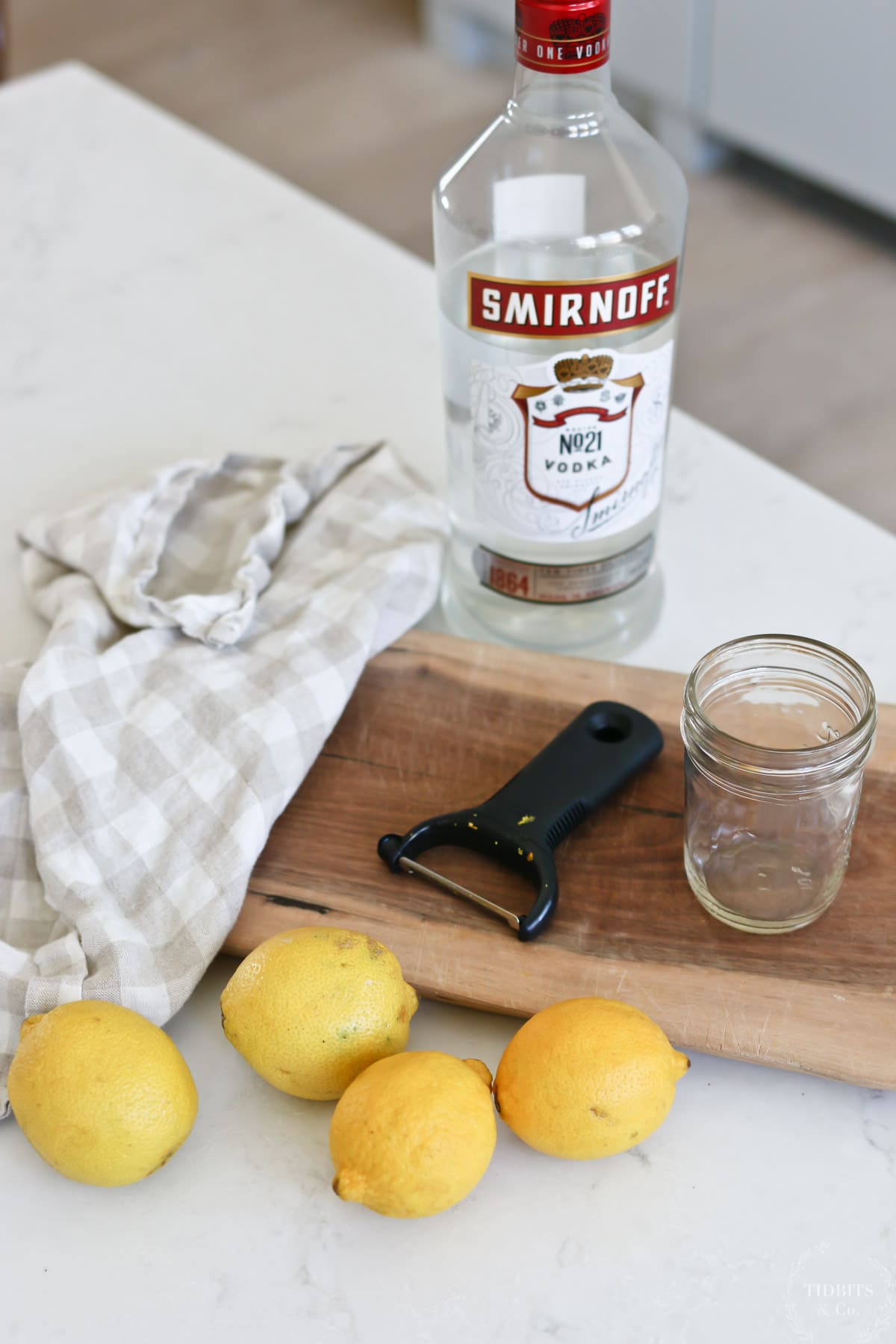
Step-by-Step Instructions
- Gather your oranges, zest peeler, clean jar and lid, parchment paper and a label.
- Use a zest peeler to peel the colorful skin off of the oranges. This zest peeler is my favorite tool for the job because it can quickly peel the fruit without getting the bitter white pith underneath, which you don’t want.
- To your clean jar, add your lemon peels.
- Pour in your vodka or your alcohol of choice. Use enough liquid to completely cover the lemon peels. Leave a bit of head space at the top of the jar.
- Place a piece of parchment paper between the jar and lid to prevent possible corrosion from the alcohol touching the metal lid.
- Seal the jar closed.
- Label the jar with the product name, start and end date.
- Place the jar or orange extract in a cool, dark place and allow it to extract for 6-8 weeks.
- Every few days, give your jar of extract a shake to help aid the extraction process.
- When the extraction time is up, check you extract. If you feel like it needs to be stronger, simply give it a little more time until you’re satisfied with the finished product.
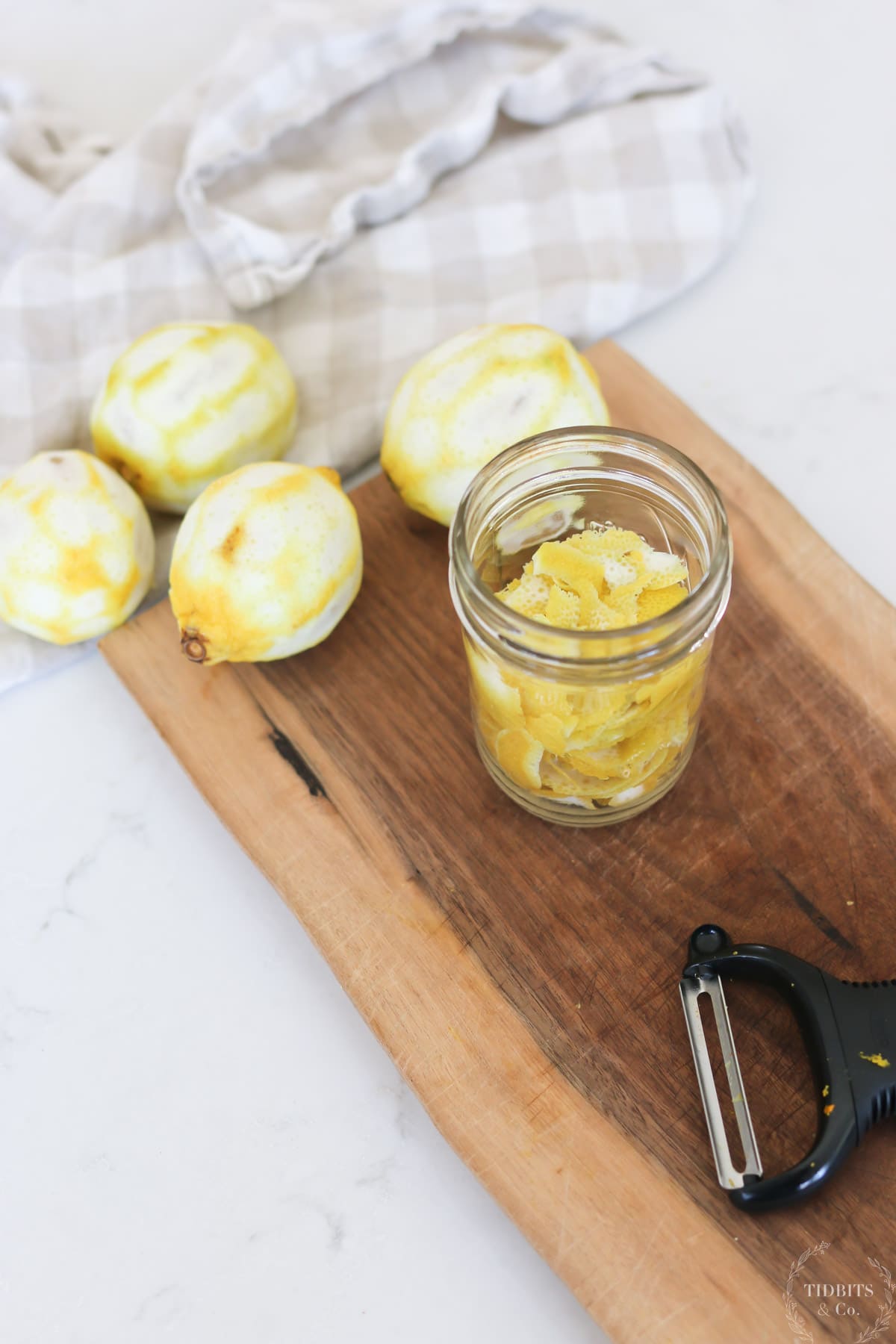
Storing Your Lemon Extract
Too much light exposure can lead to a loss of extract flavor and potency. Because of this, it’s best to store your homemade lemon extract in a dark bottle away from direct sunlight. If your extract is stored in a cool dark place away from direct sun light, it should last for several years.
If I have a lot of homemade lemon extract on hand, I like to keep it in these 16 oz amber glass bottles. I also like to use these smaller 2 oz amber glass bottles for extract. And these cute 1 oz amber glass bottles are the are the perfect size for gifts.
Free Printable Labels
A bottle of your homemade lemon extract would make a perfect Christmas gift! I have adorable printable label designs that you can download for free and size to fit whatever bottle you are using.
How to Download the Free Lemon Extract Labels
Just fill out the form below, and you will get instant access to my subscriber library where I have all my free printables and downloads.
*Already a subscriber? No need to fill out the form again. The link and passcode to the library are on each email I send.
Printing Your Label
You can print these labels at home on your own craft paper sticker labels. If you’re doing this, you’ll need blank labels like these Avery 2×2 craft paper sticker labels. You can also send these labels to a shop for printing, or have Avery print them for you.
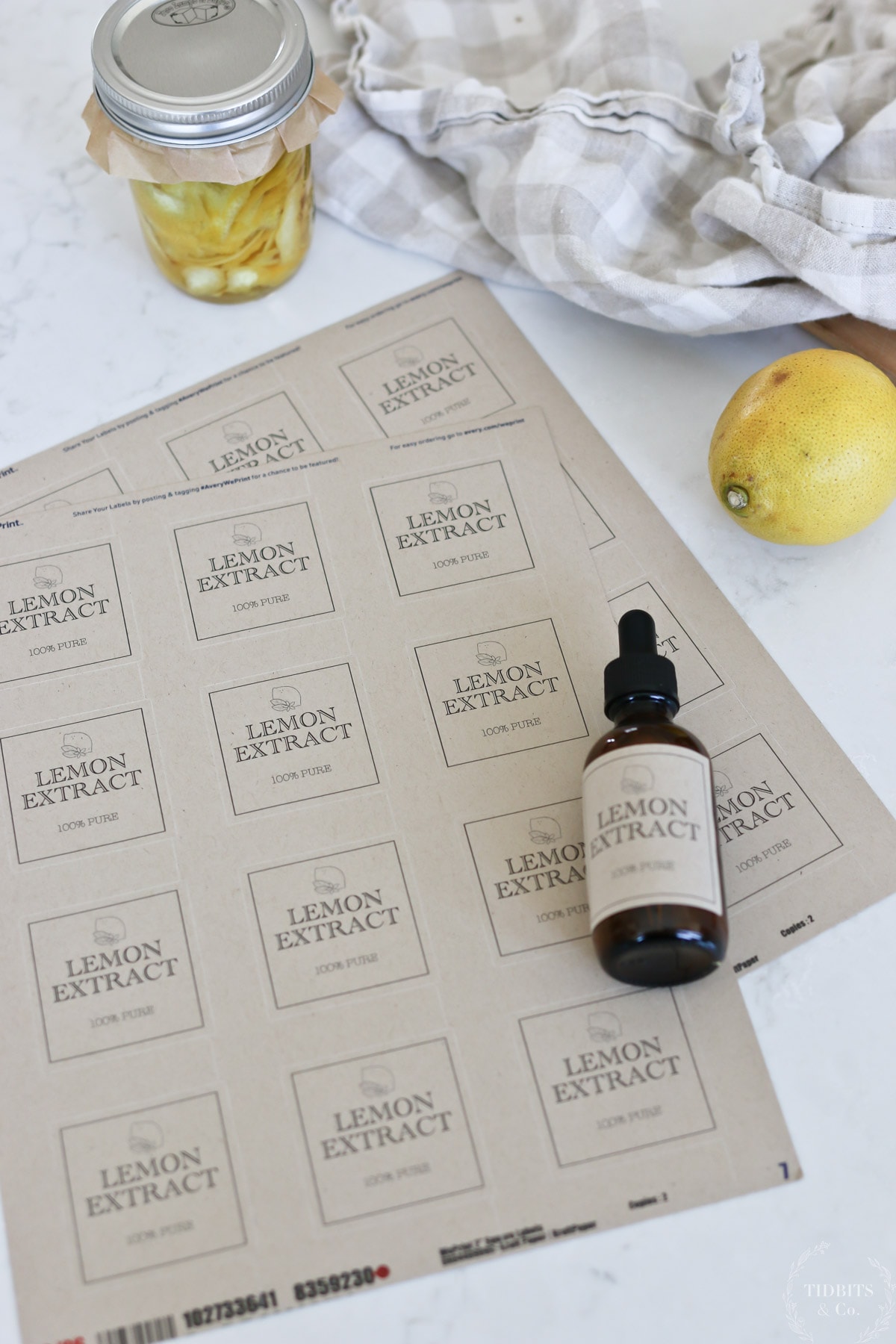
I prefer to send them out to Avery to print, since it can be difficult to get the label lined up perfectly with my printer sometimes. This way I can also order exactly what I need instead of buying a big pack of labels.
If you’re going to Avery.com print the labels for you, you’ll set up a free account, then you can upload my label design. Once onto the Avery website, you can adjust the size of the design to fit whatever label you are using for your extract bottles. Super easy and super cute!
Click over to see my How to Print and Design with Avery Labels for more details.
Lemon Extract Variations
If you want to get creative, you can experiment with different lemon extract variations. You can make these variations one of two ways – either combine existing extracts to make a mixed flavor extract – think something like lemon and lavender. Or, you can actually add other ingredients to your lemon peels as they extract. Some examples might be limes or almonds.
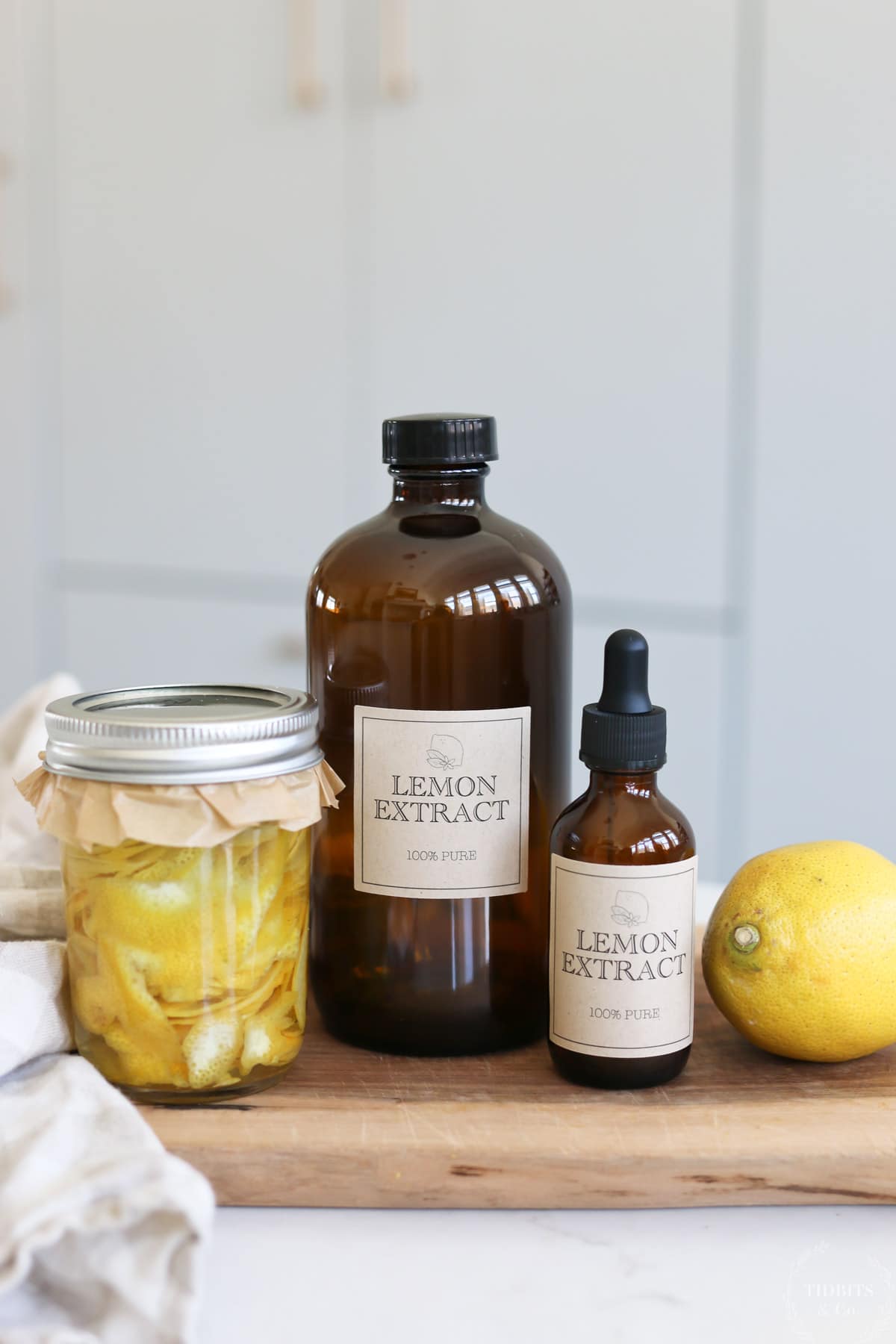
Ideas for Using Lemon Extract
Now that you know how to make lemon extract, it’s time to start using it! Of course, sweet treats come to mind right away. Lemon custards and pie sound great. And lemon frostings and cheesecake are always delicious.
You could try adding a dash of lemon extract to lemonade for some extra flavor. My basil iced tea might be another good recipe to try with a touch of lemon extract.
Even savory dishes like marinades and salad dressings that need a fresh lemon flavor could benefit from some lemon extract.
Lemon Extract Substitutes
There are a lot of different lemon flavoring products on the market today. If you read through enough recipes, you’ll likely come across some calling for lemon zest, lemon juice, lemon oil, lemon flavor and so on.
What do they all mean? Let’s take a look at the differences so that you an decide when and how to substitute lemon extract for these other products.
Common Lemon Flavoring Products
- Lemon Oil: This is the most highly concentrated lemon product. It’s made from essential oils extracted from lemon peels. Because it’s so concentrated, it is used in very small amounts.
- Lemon Extract: Lemon extract also has a highly concentrated flavor, though less intense than lemon oil. It’s made by extracting lemon oils and other flavor compounds from lemon peels into an alcohol solution. You use lemon extract in larger qualities than you would orange oil. Think about using it in quantities similar to vanilla extract.
- Lemon Flavor: Lemon flavor is similar in intensity to lemon extract. However, lemon flavor can be either naturally flavored or made from synthetic flavor compounds, depending on the variety. It’s intensity can vary, so it’s generally advised to start small and add more with this product.
- Lemon Juice: Lemon juice is often used in recipes to add flavor and acidity. Because of it’s high acidity, lemon juice is tangy and sour.
- Lemon Zest: Zest is made from finely grating lemon peels. The peels contain essential oils and are therefore very flavorful. It’s great to use when you want lemon flavor without added liquid.
As you can see, there are many ways to add lemon flavor to food. lemon extract can be used as a replacement for any of these, but keep in mind the varying flavor intensities and amount of liquid that would normally be present with each product when deciding how much extract you would use and if it will work for your recipe.
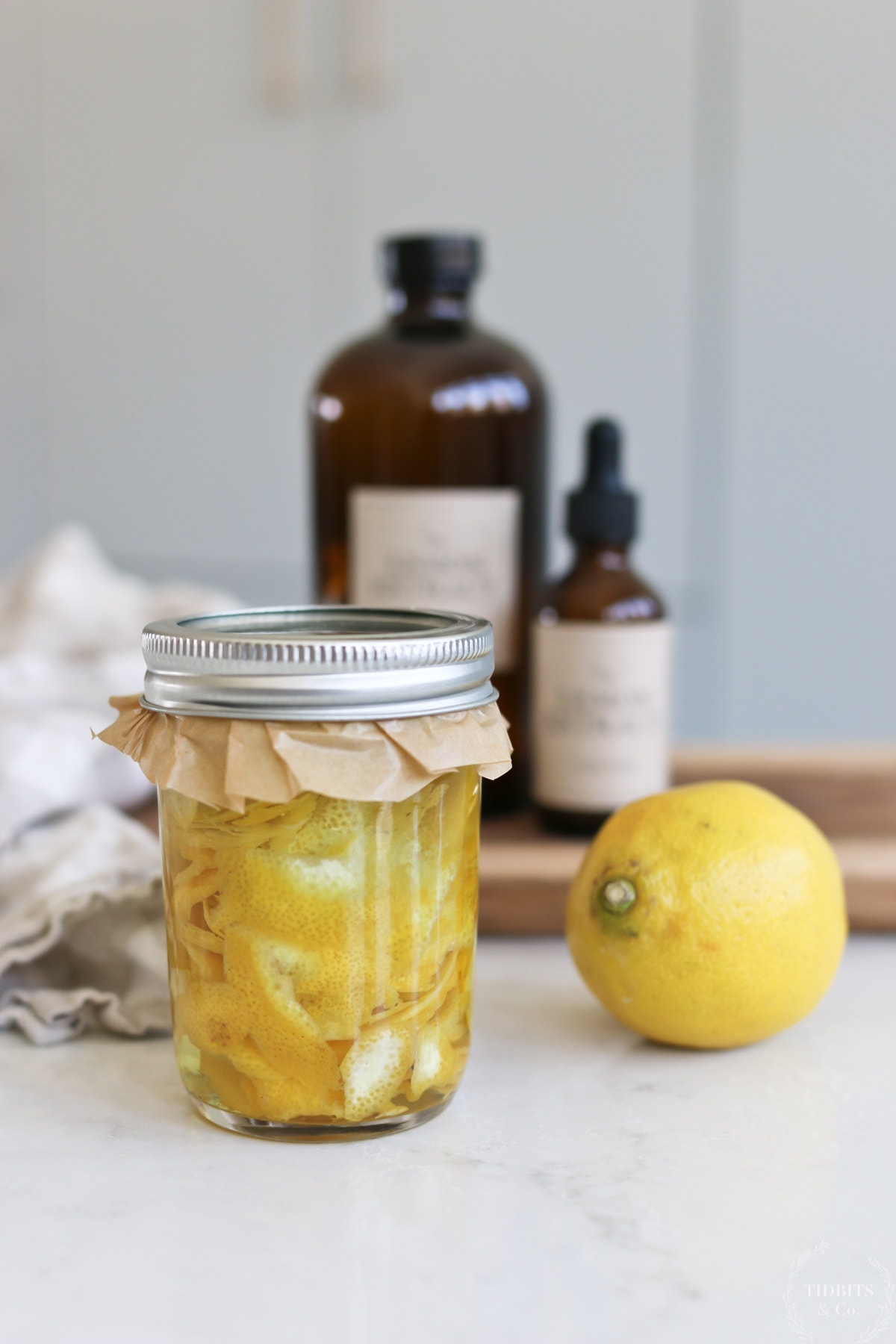
Alcohol Free Lemon Extract
In case you are wondering, yes, it is possible to make an alcohol-free lemon extract. If the case of an alcohol-free extract, you’ll use food grade glycerin as the extracting agent.
All of the measurements and instructions stay the same as the alcohol version, but in this case the extraction time will be longer since you are using glycerin. Expect your alcohol free lemon extract to take several months to fully extract. Check it occasionally until you are happy with the finished product.
Your glycerin-based lemon extract should have a shelf life of about 1 year.
Cost Analysis – Is it Worth it?
I’m sure some of you are wondering – is it worth it to make your own lemon extract? How does the cost compare to the store-bought version? Let’s take a look! Keep in mind, prices may vary depending on what you can find and fluctuations on the market.
- 8 oz of Vodka: $5.oo
- 4 lemons: $2.32
Total cost of pure homemade lemon extract: $7.32 per 8 oz.
Cost of store-bought lemon extract: $4.42 for 2 oz of McCormick Pure Lemon Extract.
That equals $17.68 for 8 oz of store-bought extract compared to $7.32 for 8 oz of homemade lemon extract!
That’s a big price difference! Clearly, pure homemade lemon extract is the cost winner here!
FAQ’s
Maybe. Keep in mind that lemon juice is highly acidic and sour. Lemon extract is not, so it will have a more sweet lemon flavor. Don’t try to substitute lemon extract for lemon juice in cases where the acidity is needed. Consider the flavor difference between the two when deciding if you want to make substitutions.
Nope. If you store your lemon extract in a cool, dark location, it won’t need refrigeration and should have a long shelf life.
If stored properly, alcohol based homemade lemon extract should be good for several years. Glycerin based lemon extract should be good for about one year.
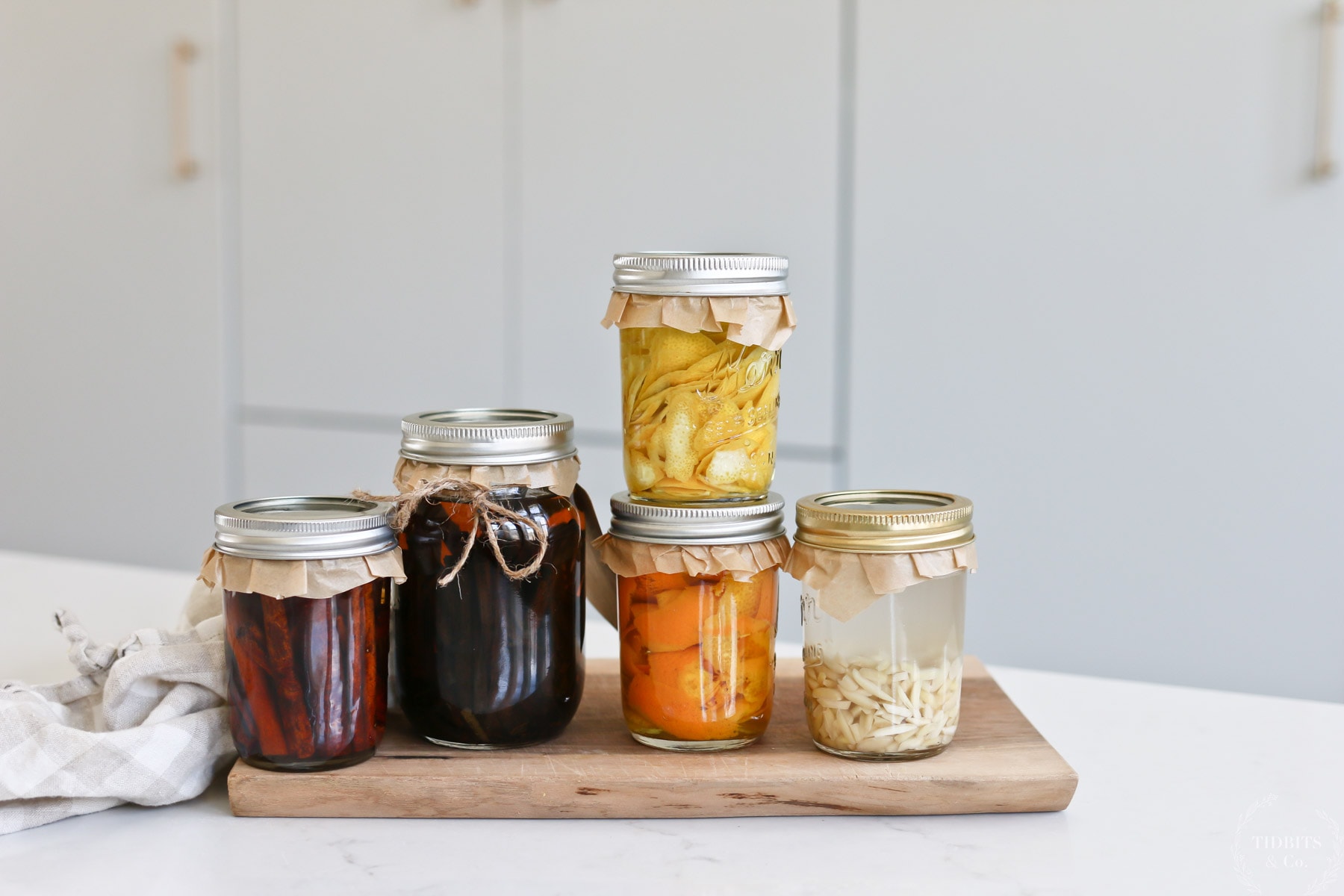
Try These Other Extract and Herbs Recipes
Homemade extracts are one of my favorite things to make. They are so easy and taste so great! I hope you’ll give this pure homemade lemon extract a try. If you want to try making some extracts or similar recipes, then check out one of these to get started:
- How to Make Lavender Extract and Tinctures
- How to Make Mint Extract + Free Printable Labels
- How to Make the Best Homemade Vanilla Extract + Free Labels
- Pressure Cooker Pure Vanilla Extract
- Pressure Cooker Infused Honey
- Make Your Own Chive Blossom Vinegar
- How to Make Orange Extract + Free Labels
- How to Make Cinnamon Extract + Free Labels
- How to Make Almond Extract + Free Labels

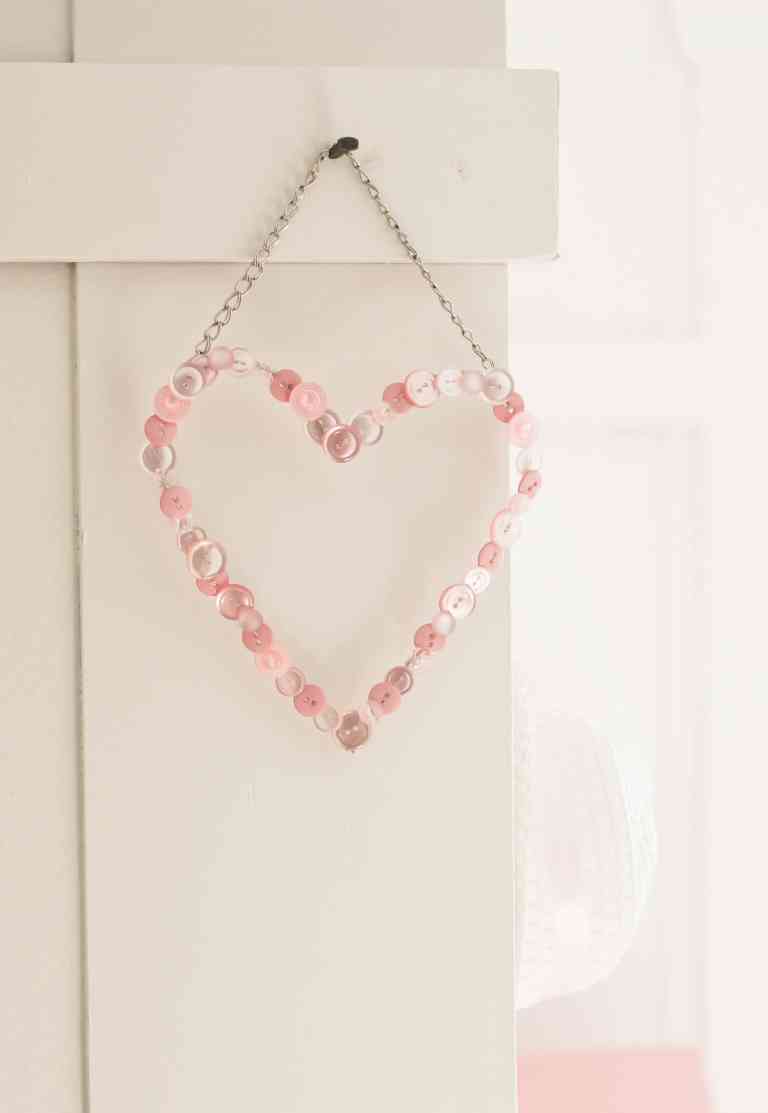
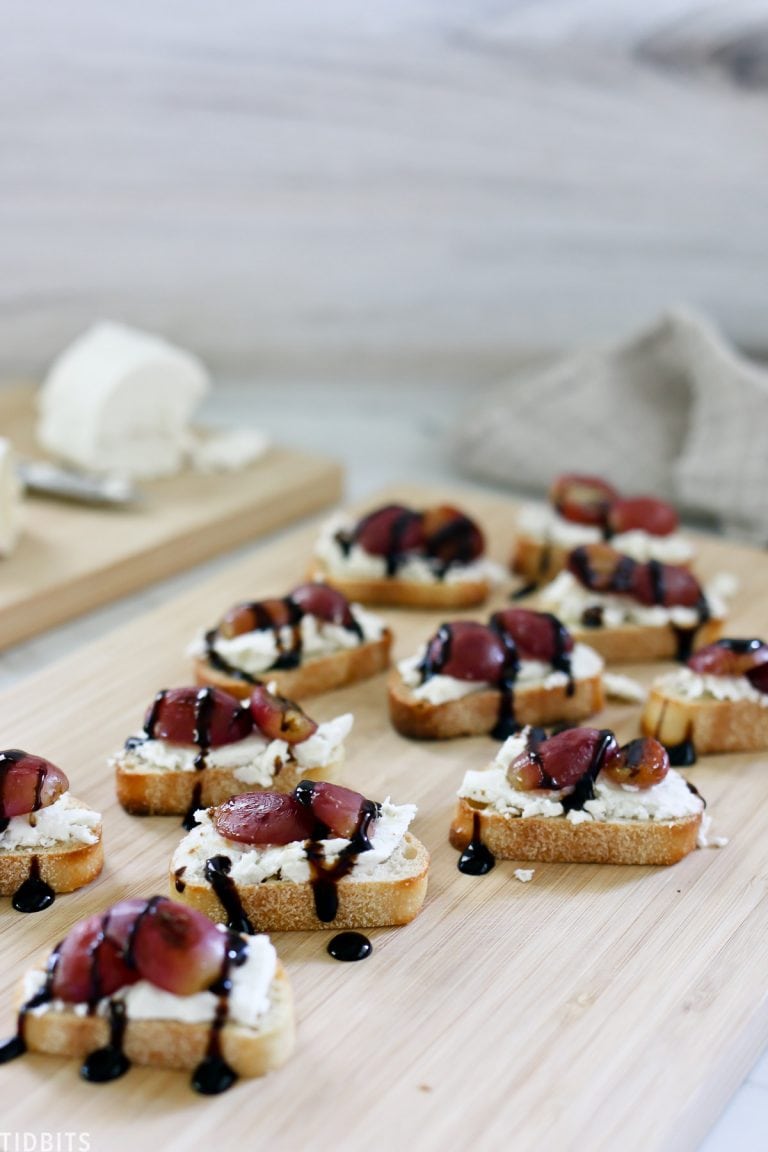
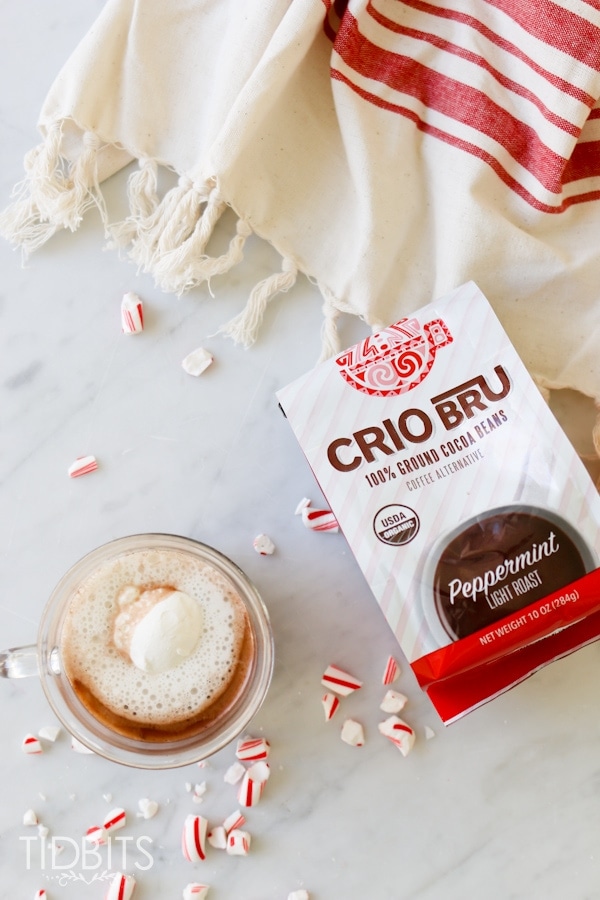
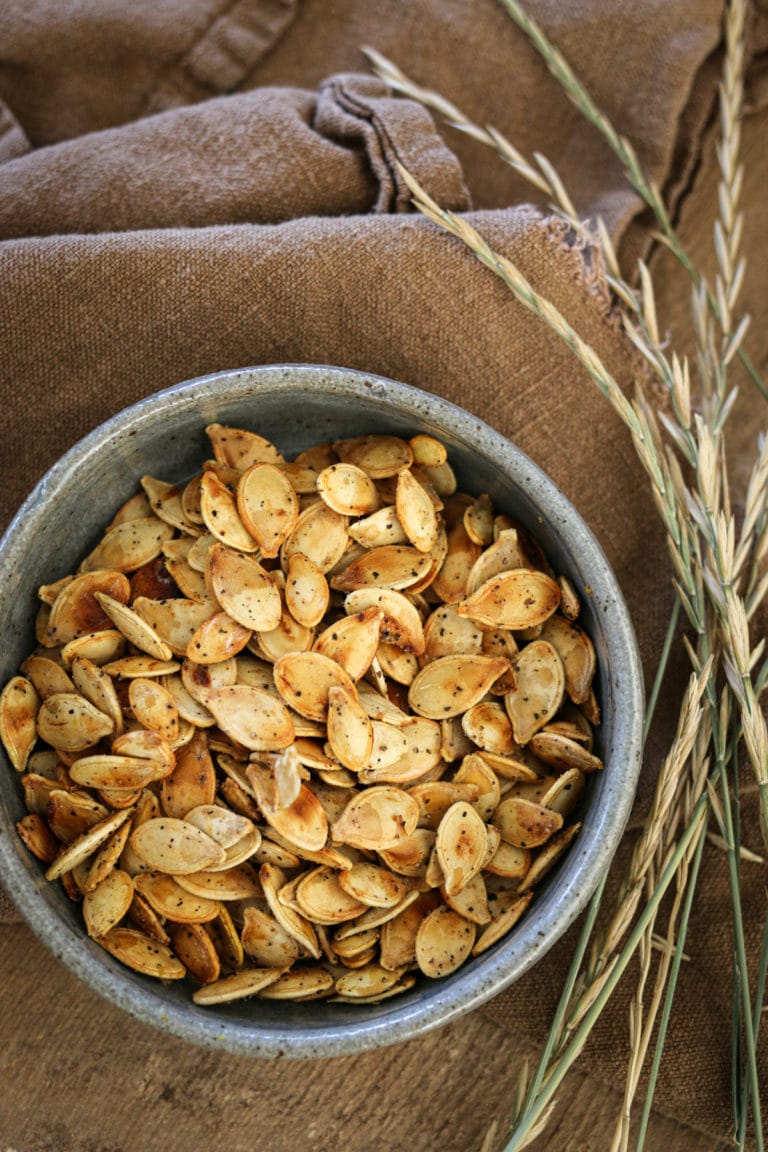
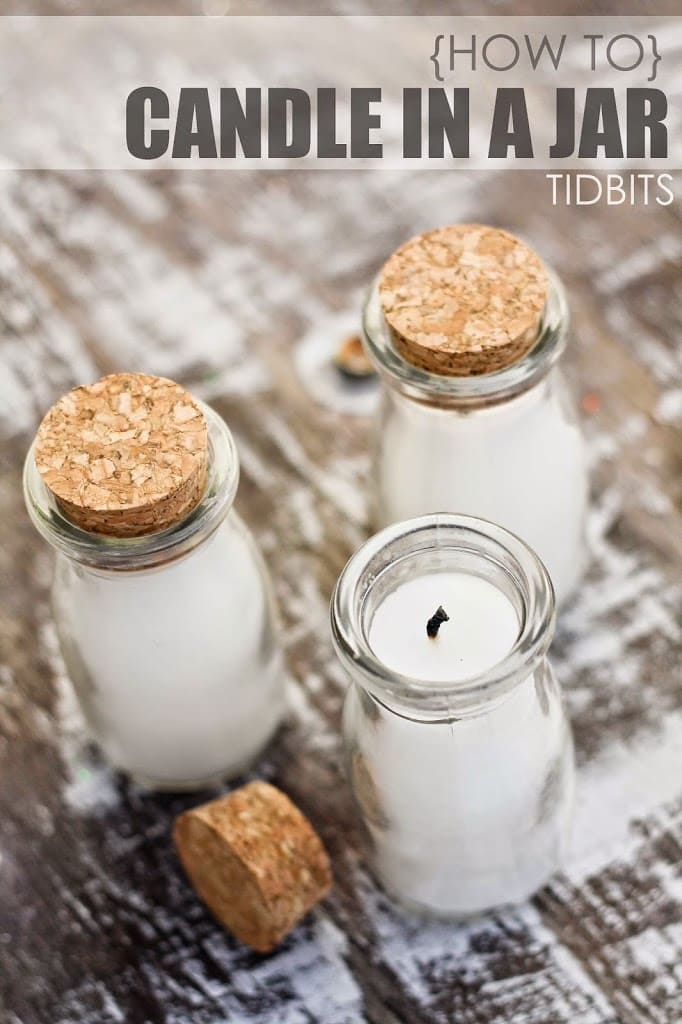







Free Printables!
Get instant access to the TIDBITS subscriber library full of free printables for the keeper of the home.
Discover more TIDBITS
Love this article? Make sure to connect with me on your favorite social platform below, and leave a comment so we can chat!